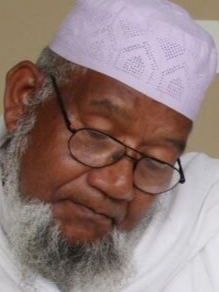Biography
Karaan was born on 15 November 1935. He acquired his primary education from Strand Moslem Primary School and Methodist Mission School and completed his matriculation from Athlone Secondary School in 1952. [6] In 1957, he moved to India where he studied at Darul Uloom Deoband for five years and graduated in 1962. [6] He was a co-founder of Strand Progressive society in 1955. He played a key role in unifying four groups of the Strand Muslim Community under the umbrella of one Strand Muslim Council in 1966. [6] According to the author of Footprints, M.A. Baderoen "The main catalyst in the formation of this new organization was Moulana Yusuf Karaan who was an outstanding speaker and impressed the local community with his sincerity, and enthusiasm to unite the community under a single governing body". He also played a key role in the foundation of United Ulema Council of South Africa in 1994. [8]
He died on 10 May 2015 in Strand, Western Cape. [6] His son Taha Karaan was also an Islamic scholar who established Dar al-Ulum al-Arabiyyah al-Islamiyyah in Strand. [5]
This page is based on this
Wikipedia article Text is available under the
CC BY-SA 4.0 license; additional terms may apply.
Images, videos and audio are available under their respective licenses.
